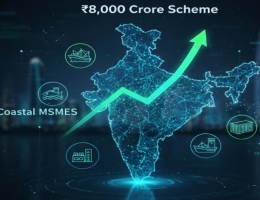
MSME sector more than makes over for its existence
MSME sector more than makes over for its existence
The Micro, Small, and Medium Enterprise (MSME) sector is considered as the backbone of the Indian Economy. And that is why it is extremely important for the growth of the economy as it not only contributes significantly to our economy but also employees who form a valuable chunk of the population.
The Union Minister of MSME, Nitin Gadkari had stated that the MSME sector contributes nearly 30 per cent to the Gross Domestic Product (GDP) while export from it is 48 per cent. It comes as no surprise that the recent events namely the implementation of GST and demonetisation had a significant impact on this sector.
The implementation of GST got together 17 taxes into one thereby simplifying the entire taxation process and streamlining this unorganised sector. By this, it enabled MSMEs to channelise their resources more productively. Similarly, demonetisation brought many MSMEs under the umbrella of digital India and reduced the sole reliance on private finance options to seek credit. Many Banks and Fintech platforms are now offering digital banking and payment solutions that have empowered MSMEs by making their processes more transparent and efficient.
Covid-19 pandemic which has had an unprecedented impact on economies globally has largely increased the adoption of digital payments among MSMEs in India. Due to the Government’s push and consumer’s apprehension towards the usage of cash, digital modes gained momentum. With digital payments, these organisations have been able to ensure timely payments, optimisation of resources, and streamlining of operations. The lockdowns did make many MSMEs go digital and hence any loophole in the ecosystem would have made them susceptible to attacks.
In the ‘Indian MSME Impact Report, 2019’, Instamojo has said that 20 per cent of MSMEs saw value from customer preference for digital payment technology, data security and synchronisation. Despite the encouraging initiatives and an increase in digital adoption, MSMEs are yet to realise their full potential. There are various challenges that persist and need to be overcome by the MSMEs
to bring more merchants under the umbrella of digital India, financial aid is of paramount importance especially for MSMEs. There are many merchants who want to go digital, but the lack of infrastructure prevents them. Also, there is a perceived high cost to digitisation which makes them apprehensive to make the switch from physical to digital or even ‘phygital’.
To tackle this, it is necessary to have policies that offer financial aid to merchants with easy repayment options. Recently, a well-known digital wallet player announced that it will offer collateral-free loans of up to Rs 5,00,000 at a low-interest rate to MSMEs. Also, features like the pay-per-use model can further encourage small Kirana store owners to adopt digitalisation.
It goes without saying that for increasing digital transactions, there must be a strong and robust infrastructure that can support the processing of seamless transactions without compromising on data security. Recently, there have been frequent digital outages with leading banks and payment providers.
In November, Peer-to-merchant (P2M) transactions contributed to 40 per cent of the overall transactions of about 885.55 million transactions. Such a astounding surge requires a strong infrastructure to support it and build confidence among smaller merchants. Data breach incidents and payment frauds create a strong sense of urgency for banks to ensure that the Maximum Tolerable Period of Disruption (MTPD) is not exceeded.











